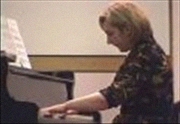Tutor HuntResources Piano Resources
Injuries In Pianists
Advice for pianists on healthy piano techniques
Date : 18/07/2019
Author Information

Uploaded by : Marina
Uploaded on : 18/07/2019
Subject : Piano
Advice for pianists on healthy piano techniquesIt is a well-known fact that
pianists are more predisposed to occupational injuries than any other
musicians. The most probable reason behind this is the nature of the instrument
itself as well as its huge musical repertoire. In addition, both hands and
fingers are equally under the constant pressure, prone to overuse. Professional
pianists as well as students preparing for piano competitions or diploma exams
often practise 6-8 hours a day or even more! Therefore, to prevent and avoid
further injuries it is most essential to understand our body (anatomy),
muscles and their function as well as the ability to spot physical traits that
includes any restriction or hand`s flexibility relating to the piano. It is
also of importance to understand
one`s mind, the emotional charge and temperament as well as
psychological traits (extroverts introverts) that could influence the
quality of performance.One of the reasons in
developing repetitive strain injuries is practising with bad habits that
are difficult to break. However, it is not impossible. Even after a recovery
from occupational injuries, a musician will most probably develop the same
problems again if they continue to practise with unhealthy piano techniques.
For this reason, it is necessary to try to correct your habits and improve your
technique as soon as possible. Prospects of changing incorrect ways of playing
depends on the person`s abilities, determination, discipline, musical talent, power
of concentration, deeper understanding of oneself and the body. It is crucial
to be patient as
it takes time to re-train the brain to learn different reflexes.To implement healthy piano techniques, it
is fundamental to always pay attention to four main aspects: the body posture that
relates to the instrument, the
position of hands arms and further problems followed
by overuse and
the release of
tension in performance. . . Release
of TensionIt is important for a
musician to understand oneself and his temperament since psychological, mental
or emotional tensions can be other factors for stiff and raised shoulders in
pianists of all ages. Often the most talented piano students or even
professionals are more vulnerable and emotionally tense than others. They are
more prone to tense shoulders frequently, stiffen the elbows, make unnecessary
movement with their hands (swinging with elbows, raising and lowering wrist
while holding the same key, pushing the keys with the fingers and so on). All
this may be counter-balanced through various meditation and breathing
techniques as well as learning mentally how to control our emotions or fears.
Through my long performing and teaching career, I have found that it is crucial for any instrumentalist to see performing as a positive, fulfilling experience and be able to enjoy the thrill of their creativity. Therefore, it is important to raise the awareness of the problems facing a young performer as soon as possible whatever the age. It can only improve the mental and emotional state of the player. Prevention is always better than cure!
This resource was uploaded by: Marina
